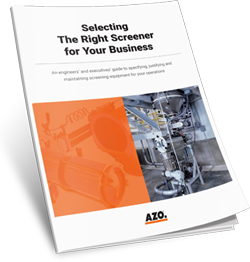The AZO Inc. Screener Guide assists engineers and executives with specifying, justifying and maintaining screening equipment for both production and safety functions alike.
Ease of consistent processing, material safety and material integrity are all greatly sustained by screening equipment. Now AZO Inc., the very organization that invented the cyclone screener, is publishing a downloadable guide that’s answering common questions about using these critical machines.
“Selecting the Right Screener for Your Business” has never been so transparent as this free 13-page guide, available for download on the AZO Inc. site.

From ancient cultures separating the “wheat from the chaff” to various advancements and new functionalities implemented for ingredient automation today, screening has an established history serving as the final safety and purity assurance check for ingredients used in consumer products.
One organization’s screening solution may not fit other processes. Still, any company considering what style screener to include in their system, how to feed from a screener into their production process or to simply understand the key principles of screener functionality will benefit from this new guide published by AZO Inc. While different buyers may require a variety of unique screening solutions, you are now one click away from comprehensively researching your screening options.
“Screeners are mature pieces of equipment,” said General Manager of AZO Inc. Chuck Kerwin. “The idea is that you are screening your products just before they go into production. At that point, you want to make sure the material you're conveying is clean and pure because it's going right into the mixer at the start of the production process.”
Screener maintenance tips, as well as sizing and analysis options for your application, can be found in “Selecting the Right Screener for Your Business.” Specific material designs and surface finishes available from AZO Inc. are also included in this screener buying guide.
Even though screeners are not often purchased solely for conditioning material, these machines are particularly useful in gently breaking apart small and soft lumps to make weighing to gram accuracy more consistent.
“Lumps generally make it difficult to weigh product,” Kerwin said. “They make it difficult to feed and they complicate the downstream processing. Screeners break up these agglomerations.”
Since AZO Inc. founder Adolf Zimmermann introduced the first mechanical centrifugal screening device in 1952, many users refer to any cyclone-style screener as an “AZO.”
“Ultimately you could say that AZO’s design has been copied but never duplicated,” Kerwin said. “There's a lot of equipment out there that looks like an AZO Screener, but if you take a close look at the details — the welds, the thickness of the metal — it's not the same screener.”
According to Kerwin, the company has constantly improved its reliable screener models with new functionalities since that first cyclone screening machine.
“Screeners are the most diversified product that AZO makes,” Kerwin said. “We have more models, more sizes and more ‘bells and whistles’ on our screeners than we do on any other product.”
About AZO, Inc.
AZO, Inc. engineers, builds and installs components and complete systems for bulk material handling requirements. A wholly-owned subsidiary of AZO GmbH, the company supports U.S. customers with technical support from its central U.S. location and rapid parts delivery hub in Memphis, TN. AZO equipment is used in companies ranging from small, family-owned businesses through the world’s best known industrial and consumer products companies. AZO equipment is widely used in industries including food, snack, bakery, chemical, plastics, confectionery and pharmaceutical. More info about our company, as well as common questions related to the world of ingredient handling, can be answered on our company blog.

